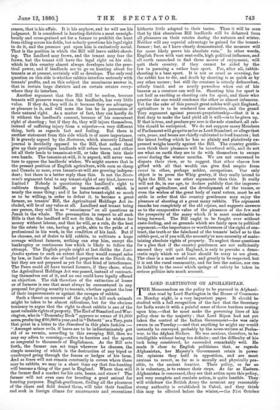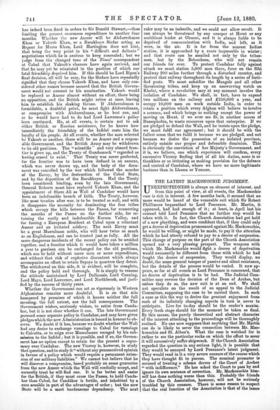LORD HARTINGTON ON AFGHANISTAN.
T HE Memorandum on the policy to be pursued in Afghani- .1 sten read by Lord Hartington in the House of Commons on Monday night, is a very important paper. It should be studied with a full recognition of the fact that the Secretary for India wrote it with a painful sense of three burdens resting upon him,—that he must make the governing lines of his policy clear to the majority ; that Lord Ripon had not yet. taken the control of the Indian Government—he was only sworn in on Tuesday ;—and that anything he might say would., instantly be conveyed, probably by the news-writers at Pesha- - wur, to the Afghan Birders. He was anxious, therefore, to be • intelligible without being too definite; and the difficulty of his task being considered, he succeeded remarkably well. He made it dear to English politicians that, as regards Afghanistan, her Majesty's Government retain in power the opinions they held in opposition, and are most anxious to revert, so far as is morally and physically poe- Bible, to the ancient frontier. Their policy, so far as. it is voluntary, is to retrace their steps. As far as Eastern. Afghanistan is concerned, they see that action upon this policy, and very complete and resolute action, is quite feasible. They - will withdraw the British Army the moment any reasonably strong authority is established in Cabal, and they think this may be effected- before the winter,—the 31st October has indeed been fixed in orders to Sir Donald Stewart,—thus limiting the present enormous expenditure to another four months. Whether the new Ameer will be Abdurrahman Khan or Yakoob Khan, or a Barukhzye Sirdar acting as Regent for Moosa Khan, Lord Hartington does not hint, that being the very point in his " difficult and delicate" negotiations which he is anxious to keep concealed ; but we judge from the changed tone of the Times' correspondent at Cabul that Yakoob's chances have again revived, and that he may yet be reinstated in the position of which our fatal friendship deprived him. If this should be Lord Ripon's final decision, all will be easy, for the Sirdars have repeatedly signified that they choose Yakoob Khan, and have only con- sidered other names because assured that the British Govern- ment would not consent to his nomination. Yakoob would be replaced as Ameer almost without an effort, there being no opposition, and the British might retire at once, leaving him to establish his shaking throne. If Abdurrahman is formidable, a doubtful point, he must fight Abdurrahman, or compromise with Abdurrahman, as he best can, and as he would have had to do had Lord Lawrence's policy been continued. He, at all events, is certain not to ask either British or Russian assistance, for he knows how immediately the friendship of the Infidel costs him the loyalty of his people. At all events, whether the man selected be Yakoob or another, there will be an Ameer and a respon- sible Government, and the British Army may be withdrawn to its old positions. The " scientific " and very absurd fron- tier is given up, and the Treaty of Gundamuck "regarded as having ceased to exist." That Treaty was never perfected, for the frontier was to have been defined in an annexe, which was never drawn up, and the body of the docu- ment was cancelled by the war which followed the murder of the Envoy, by the destruction of the Cabul State, and by the deposition of the Barukhzyes. Had the Treaty been considered binding, even by the late Government, General Roberts must have replaced Yakoob Khan, and the appointment of Shere Ali as Wali of Candahar would have been an indefensible breach of faith. The Treaty, however, like most treaties after war, is to be treated as null, and with it disappears the necessity for dominating the free tribes which occupy the hills between the Passes, for connecting the mouths of the Passes on the further side, for re- taining the costly and indefensible Kurum Valley, and for forcing a European Resident at Cabul upon a reluctant Ameer and an irritated soldiery. The next Envoy must he a great Mussulman noble, who will hear twice as much as an Englishman, and can be trusted just as fully. All the more dangerous incidents of the recent policy can be avoided together, and a frontier which it would have taken a million a year to garrison can be exchanged for the old positions, which can be held without more men or more expenditure, and without that risk of explosive discontent which always accompanies an effort to retain Sepoys in quarters they detest. The withdrawal on this side, it is evident, will be complete, and the policy bold and thorough. It is simply to resume the attitude maintained by Lord Dalhousie, Lord Canning, Lord Mayo, Lord Lawrence, and Lord Northbrook, and justi- fied by the success of thirty years. Whether the Government can act as vigorously in Western Afghanistan remains more doubtful. It is on that side hampered by promises of which it knows neither the full meaning, the full extent, nor the full consequences. The Government wishes, anxiously wishes, to retire from Canda- har, but it is not clear whether it can. The late Government pursued some separate policy in Candahar, and may have given pledges which the new Administration is bound in honour to ob- serve. We doubt if it has, because we doubt whether the Wali had any desire to exchange vassalage to Cabul for vassalage to Calcutta, or to reign over Mussulmans enraged by his sub- mission to the Infidel ; but it is possible, and if so, the Govern- ment has no option except to retain for the Present a supre- macy over Candahar. The new Viceroy is, however, to study that question, and to study it "without any preconceived opinion in favour of a policy which would require a permanent exten- sion of our military liabilities." We cannot but believe that he will discover a compromise, based probably on some guarantee from the new Ameer which the Wall will cordially accept, and earnestly trust he will find one. It is far better and easier for the British, if they must cross the Passes, to hold Cauda- l= than Cabul, for Candahar is fertile, and inhabited by a race sensible in part of the advantages of order ; but the new State will be a most burdensome dependency. The next ruler may be an imbecile, and we could not allow revolt. It can always be threatened by any usurper at Herat or any ambitious leader at Ghuzni, and it is always liable to be deprived of communication with India, and left, as it were, in the air. It is far from the nearest Indian station, it is approached by a route impassable in winter ; and that route can be assailed not only by the tribes- men, but by the Beloochees, who will not remain our friends for ever. To protect Candahar fully against attack we must station 5,000 men there, force on the Sibi Railway 200 miles further through a disturbed country, and protect that railway throughout its length by a series of forti- fied posts. We must subsidise the Menges and all other threatening tribes, and keep up an unswerving watch on Klielat, where a revolution may at any moment involve the isolation of Candahar. We shall, in fact, have to expend two millions on the railway and £250,000 a year, and occupy 10,000 men on work outside India, in order to retain a position which every Afghan will believe to involve a menace, and which brings us nothing except the power of moving on Herat, if we ever see fit, in another access of Russophobia, to waste resources upon that enterprise. If we are pledged to defend the Wali, and he insists upon the pledge, we must fulfil our agreement ; but it should be with the fullest sense that we fulfil it because we are pledged, and not because we desire the possession of an isolated province, entirely outside our proper and defensible dominion. This is obviously the conviction of her Majesty's Government, and it is, we believe, one which experience will confirm, every successive Viceroy finding that of all his duties, none is so thankless or so irritating as making provision for the defence and control of Candahar, where we have no more legitimate business than in Lhassa or Yunnan.



































 Previous page
Previous page